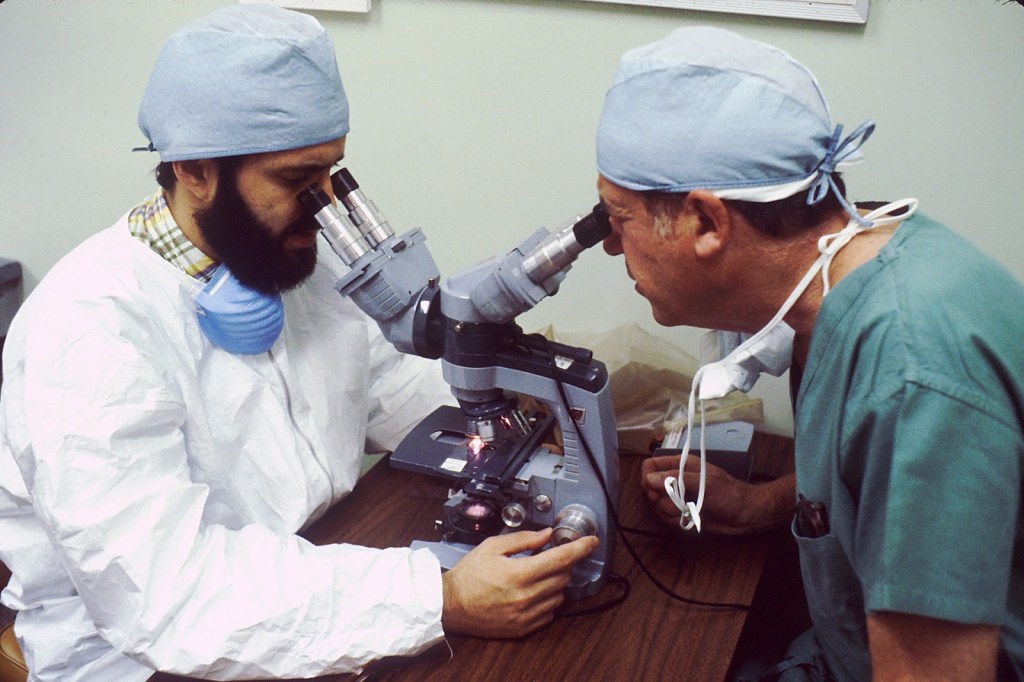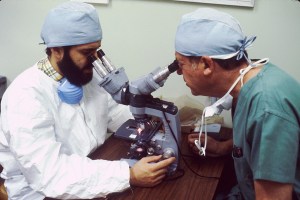The Future of Healthcare: Trends, Technology & New Skills for Success

Advancements in technology have changed the way consumers manage their own healthcare and interact with medical providers. A recent survey from Morning Consult found that 34% of U.S. adults currently track or manage their health using a mobile app. Specialized care delivery facilities are on the rise, and new tech trends are making healthcare more personalized than ever. In addition, telehealth technology allows patients to access health services, such as virtual appointments, from the comfort of their homes.

Healthcare professionals must adopt these trends and technologies — such as outpatient care centers, precision medicine, predictive analytics, and real-time data visualization — to provide optimal care for patients.
Trends for the Future of Healthcare Technology
Providing a stellar patient experience is top priority in the healthcare industry, and many providers are shifting their focus from volume- to value-based care. Instead of following a traditional fee-for-service model, value-based care rewards providers by determining the cost of the service as it relates to the quality of care, patient outcomes, and other factors. Forbes predicts that up to 15% of global healthcare spending will be on value-based care by the end of 2019. As technology improves, allowing medical professionals to better track quality of care, bundle packages, and transition to Electronic Health Records (EHRs), value-based care will become a more viable option.
This is great news for patients, as the quality of their individual experience takes center stage. The next generation of healthcare administrators will help leverage technologies that will allow their facilities to adapt to this new approach. Completing a program such as an online bachelor’s degree in general studies with a concentration in healthcare can prepare professionals to become leaders in implementing value-based care strategies.
The future of healthcare services will ask professionals to integrate traditional skills in care, communication, and leadership with new skills in technology and analytics. These new skills will work in tandem with the adoption of the following trends and advancements:
Specialized Outpatient Care Centers
To improve the patient experience, healthcare providers are offering more timely and specialized treatment. Outpatient surgeries, or same-day surgeries, are typically less complex, and they include cataract removals and colonoscopies. Instead of the traditional hospital setting, these procedures are now offered at ambulatory surgery centers (ASCs).
ASCs and other specialized outpatient care centers help reduce overall medical costs by moving specialized services to locations with that sole focus. This frees up space and staff at larger medical institutions, while also providing more focused care for the patient at the ASC. The quality of care is also improved, as specialists are able to work in an environment focused around their area of expertise. ASCs also require reporting and quality measures almost double those of outpatient surgeries in similar hospital settings.
Healthcare professionals must educate consumers on the benefits of these specialized facilities through the use of quality data that compares ASCs and hospitals for outpatient care. Health educators play an important role in helping raise awareness about ASCs to the public and can help navigate patients to an ASC environment as appropriate.
Precision Medicine for Personalized Healthcare
In contrast to a one-size-fits-all approach, precision medicine takes into account an individual’s genes, environment, and lifestyle to identify personalized disease treatments and prevention strategies. Best known for its uses in oncology, such as tracking the genetic profile of patient’s tumor cells to identify the most effective forms of treatments, precision medicine is also impacting pharmaceutical research and healthcare technology.
With more than 6,000 known genetic diseases, healthcare organizations need the right technology to manage patient data and apply insights to patient care. According to a study by Scipher Medicine, 65% of patients prescribed the top five selling drugs in the world did not respond to treatment. However, precision medicine offers an opportunity to more accurately predict if a patient will respond to a particular drug therapy, helping to lower healthcare costs associated with wasted prescriptions and ineffective patient treatment, as well as to prevent unnecessary side effects and drug interactions.
Precision medicine is also expanding to the realm of preventive healthcare, allowing patients to make lifestyle choices to stay healthy and track their physical well-being. As the future of healthcare technology gains a more patient-centered focus, healthcare professionals will utilize existing technologies like wearables to collect consumer health data and analyze it in a way that patients can understand and leverage with ease.
Predictive Analytics for Population Health Management
Many facets of the healthcare industry are relying on data more each year. The information gathered allows healthcare providers to leverage analytics to improve the health of the population and identify at-risk individuals through population health management (PHM).
PHM is the aggregation of patient data across multiple sources, including payers, hospitals, primary care providers, specialists, pharmacies, and more. The analysis of this data to create a single patient record helps healthcare providers to improve both clinical and financial outcomes. Forbes predicts that 50% of all healthcare companies will have dedicated resources to access, share, and analyze real-world data to use across their organizations by the end of 2019.
Healthcare administrative professionals and data scientists receive this data in real-time and use the insights gained from its analysis to identify and address gaps in patient care within the population. They can use this information to develop care management programs that optimize outcome and cost savings. The future of healthcare services requires intelligent application of PHM programs by healthcare administrators, who can create and implement policies, plan and oversee budgets, and ensure compliance with procedures and regulations.
Real-time Data Visualization
The use of big data in the medical field is not a new phenomenon, and the future of healthcare includes advances in predictive analytics to increase response efficiency, provide real-time reporting, and identify at-risk populations. Predictive analytics is on track to be a more than $9 billion industry by 2020. It works by using historical information and transactional data to predict health-related occurrences, such as how the weather might affect patients with respiratory ailments.
As healthcare organizations move toward sharing more data with each other, the collection and creation of larger datasets will increase accuracy and allow organizations to spot trends. For example, a network of hospitals that shares data can better predict when flu season will hit and how severe the strain will be.
Healthcare administrators must keep up with ever-evolving technologies to prepare organizations to move toward real-time data visualization to meet patient demands. Administrators must collaborate with doctors, technicians, medical centers, IT teams, and government bodies to facilitate the implementation of advanced technologies.
Telehealth
Advancements in the future of healthcare will also have an impact on the treatment of a variety of medical needs. Telehealth — the ability to engage in healthcare quickly and seamlessly through technology like smartphones, laptops, and streaming services — marks a significant shift in the modern world of healthcare. Accessibility is improved, as those who do not live near a medical facility can leverage telehealth to connect with their healthcare professional more regularly. Additionally, those who require treatment for certain disorders, such as a communication disorder or a mental health disorder, can engage in treatment from the comfort of their home, via video chat.
The application of telehealth to communication disorders is still relatively new, but degree programs in communication sciences and disorders are preparing aspiring speech language pathologists and other professionals for the intermingling of traditional methods of care and telehealth.
Improving Patient Experience
Patient wellness is the heart of healthcare. As technologies advance and the prevalence of data grows, healthcare professionals use insights from the latest trends to help improve the quality of patient care. A career in the healthcare industry can be rewarding, as medical professionals play a hand in improving population health, as well as helping to lower healthcare costs.
Explore the Future of Healthcare Services
If you’re interested in pursuing a rewarding, fast-paced career in the healthcare industry, explore Maryville University’s online healthcare degrees. Each of Maryville’s online healthcare degree programs can prepare you for success in the role you’re most passionate about. Maryville offers both bachelor’s and master’s programs that you can complete online, so you can prepare to step up and fill vital roles in the healthcare field.
Sources
CIO Review, “Improving Predictive Analytics with Data Visualization”
Forbes, “Top 8 Healthcare Predictions for 2019”
Healthcare IT News, “The future of personalized health is scientific wellness”
Maryville University, Bachelor of Science in Communication Sciences and Disorders
Maryville University, BA General Studies Healthcare Careers
Maryville University, Online Healthcare Degrees
Morning Consult, “Wearable and App Users Tracking Health Tech’s Next Step”
Revcycle Intelligence, “What is Value-Based Care, What It Means for Providers?”

